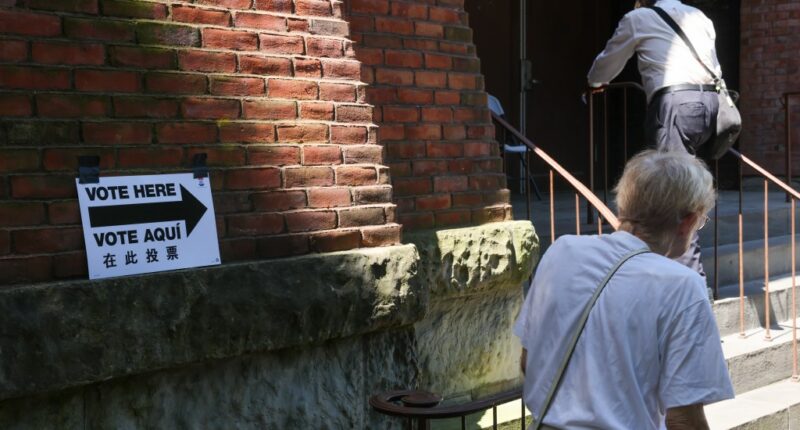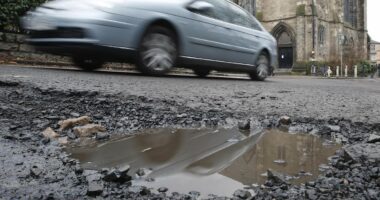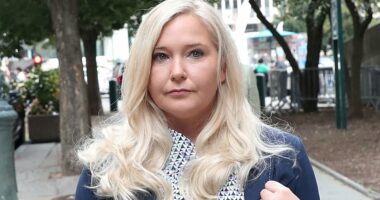Share this @internewscast.com

Next month, during the elections, New Yorkers will decide between mayoral candidates who offer distinct plans. However, they all concur on one point: The current situation is failing New Yorkers.
This viewpoint is supported by the Citizens Budget Commission’s survey “Straight from New Yorkers”, conducted earlier this year. It revealed that only 34% of New Yorkers now rate the city’s quality of life as excellent or good, a decrease from 51% before the pandemic.
Although most serious crime is declining, New Yorkers’ fear remains high: Only 42% feel safe in their neighborhood.
The rising costs of housing and taxes pose a risk of pushing more residents away. When questioned about potential reasons for leaving, they highlight affordability, safety, living space, and taxes as key concerns.
Currently, just 27% of New Yorkers rate the city’s services as excellent or good, a significant drop from the pre-pandemic 44%. While services like the Fire Department and waste collection receive positive feedback, services related to homelessness, mental health, and substance abuse are poorly rated.
These underwhelming services are more than just an inconvenience; they’re seen as a waste of resources. With some of the highest taxes in the country, New Yorkers expect value for their money.
No wonder only 11% of New Yorkers think the city is spending their tax dollars wisely.
The citizens desire their next mayor to elevate the city’s status as a hub of opportunity, cultural and economic vitality, and creativity. Achieving this requires more than mere campaign rhetoric. It calls for decisive actions and effective management that produce tangible outcomes, even with the inherent challenges and demands of leadership.
The next administration will have to close next year’s $6 to $8 billion budget gap and prepare for the onslaught of federal cuts. It will face the limits of its power on everything from tax policy to infrastructure approvals, and political pressure to provide almost every constituency a near infinite array of services.
Government cannot provide all things to all people — but the next mayor can deliver services that work, and a more affordable, livable, stable city. How? By making smart choices.
The Citizens Budget Commission has gathered some of the city’s most experienced practitioners across government, labor, and business at CUNY’s Baruch College today for a deep dive into smart choices the next mayor should make — bold actions within the reality of governing.
Sure, there will be disagreements. That’s welcome. New York has overcome its greatest challenges when New Yorkers from different sectors devised common solutions.
Fiscal instability threatens to unleash damaging service cuts. It’s the smart choice to bring spending in line with revenues.
Our nation’s highest taxes generate plenty of money to meet needs. It’s the smart choice to spend it better, getting value out of every dollar.
It’s the smart choice to deposit money into the Rainy Day Fund to protect New Yorkers from a future recession, though it may mean not starting a program today. All candidates endorsed this; let’s see the winner follow through.
It’s the smart choice to build a cushion to protect New Yorkers from the impact of looming federal cuts. The story is still unfolding, with enacted cuts to Medicaid and SNAP phasing in and cuts to housing, health, and education likely coming.
Running programs well can protect our neighbors from cuts. For example: making fewer errors in determining who is eligible for SNAP — like we used to — can stave off hundreds of millions of dollars in cuts.
It‘s the smart choice to focus on programs in education, housing, homelessness, and mental health that are proven to work, while eliminating those that don’t — no matter how popular.
It’s the smart choice to supercharge housing production citywide, though some may object to new housing in their neighborhood. The City of Yes will help, but it still leaves 80% of the production need unfilled. New Yorkers should vote Yes on Charter
amendments, 2, 3 and 4. They will help but are still not enough.
Let’s fast-track more affordable housing, get the state to streamline environmental review, and finally reform the property tax — another critical change all candidates have endorsed.
It’s the smart choice to focus capital dollars on getting our infrastructure to a state of good repair, even though it could mean pausing some grand new projects. Fixing the BQE and aging sewers may not be sexy, but they’re essential.
Campaign promises can be inspiring, but smart choices make progress. A better future for all New Yorkers depends on leaders who will follow through and deliver.
Rein is president of the Citizens Budget Commission.

















